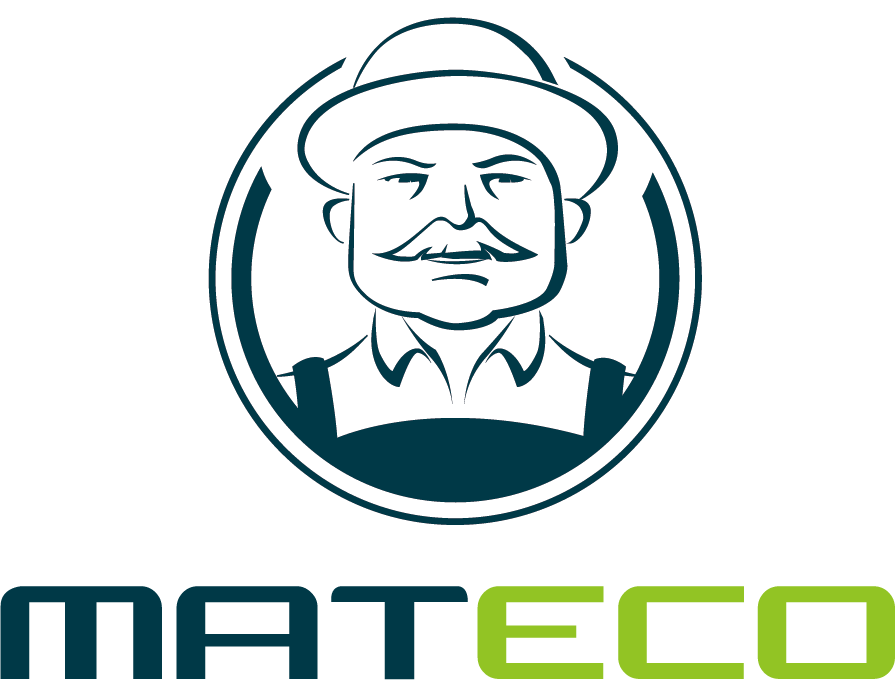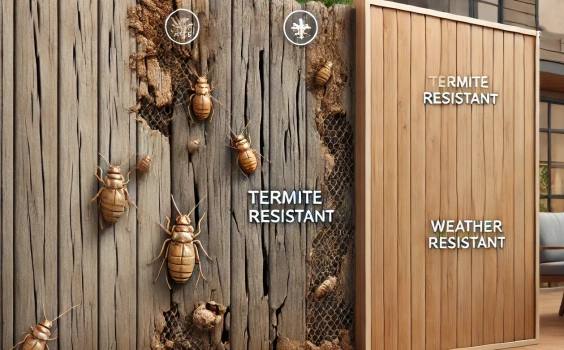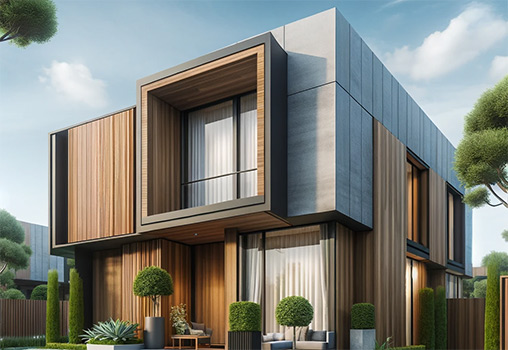What is WPC?
WPC, or Wood-Plastic Composite, has become a buzzword in the home improvement and construction industries. But what exactly is WPC, and why is it garnering so much attention? Let's dive in and explore the world of WPC wood panels.
What does WPC do?
WPC, a composite crafted from thermoplastics, calcium carbonate, and wood flour, is extruded to form a core substance. Touted for its waterproof, rigid, and stable properties, WPC circumvents many shortcomings of traditional engineered wood while still capturing the aesthetic of natural wood.
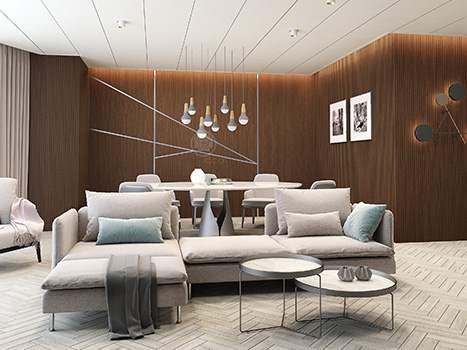
WPC wood panels home design
The Rise of WPC Wood Panels
The demand for WPC wood panels has surged in recent years. Here's why:
1) Durability: Unlike traditional wood, WPC wood panels are resistant to rot, decay, and termites. This makes them a long-lasting option for both indoor and outdoor applications.
2) Low Maintenance: Say goodbye to regular polishing or staining. WPC wood panels require minimal upkeep, saving both time and money.
3) Versatility: From decking to wall cladding and from pergolas to furniture, the applications of WPC wood panels are vast.
4) Eco-Friendly: Many WPC products are made from recycled materials, making them a green choice for environmentally conscious consumers.
How is WPC Made?
The production of MATECO WPC involves mixing wood fibers, often from wood chips, sawdust, or recycled wood, with plastic materials like PVC. The mixture is then heated and extruded into the desired shape, such as panels, or boards. The end product is a solid, sturdy, and versatile material that has found its place in various applications.
Is WPC waterproof?
Yes, WPC (Wood-Plastic Composite) is considered waterproof. One of the primary advantages of WPC over traditional wood is its resistance to water and moisture. Here's why WPC is waterproof:
1) Plastic Component: The plastic content in WPC provides a barrier against moisture penetration. This makes WPC less susceptible to water damage compared to traditional wood.
2) No Absorption: Unlike traditional wood, which can absorb water and swell, WPC does not readily absorb water. This prevents issues like warping, rotting, and mold growth.
3) Ideal for Damp Environments: Due to its waterproof nature, WPC is often used in environments where water exposure is frequent or inevitable, such as outdoor decking, bathroom flooring, and kitchen areas.
4) Resistance to Decay: The waterproof quality of WPC also means it's resistant to decay, which is often caused by prolonged moisture exposure in traditional wood.
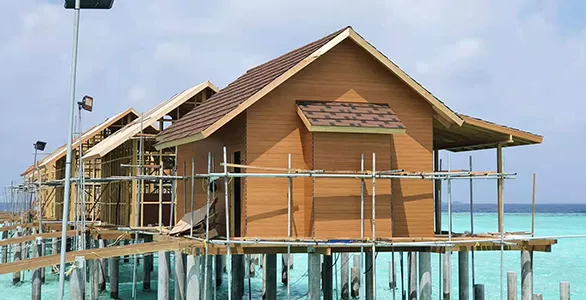
WPC wood panels house next to the sea
Is WPC more expensive than wood?
WPC (Wood-Plastic Composite) typically has a higher initial cost than traditional wood. Here are some reasons for the price difference:
1) Complex Manufacturing: WPC wood panels combine wood fibers with thermoplastics. The manufacturing process is more intricate, often making WPC more expensive to produce.
2) Enhanced Features: WPC offers several benefits over traditional wood, including resistance to rot, decay, and termites. Its durability and long lifespan can contribute to its higher price point.
3) Maintenance Savings: While WPC's upfront cost might be higher, its long-term maintenance costs are often lower. Traditional wood might require periodic treatments, staining, or painting, which can add up over time.
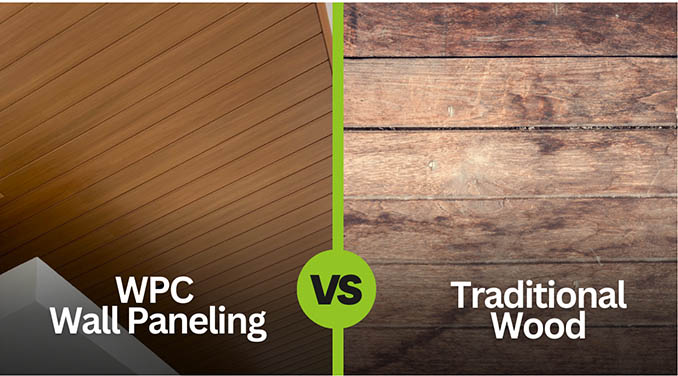
WPC vs Wood
But if we're considering the cost implications of WPC (Wood-Plastic Composite) versus traditional wood over time, several factors come into play:
1) Maintenance Costs: Over the years, traditional wood often requires more maintenance than WPC. Wood may need periodic treatments, staining, or painting to protect it from elements and maintain its appearance. In contrast, WPC typically requires less maintenance, leading to potential cost savings over time.
2) Replacement Costs: Due to its resistance to rot, decay, termites, and moisture, WPC wood panel generally has a longer lifespan than traditional wood in many applications. As time goes by, you might find that wooden installations require replacements or significant repairs, while WPC wood panel remains relatively intact. This durability can lead to long-term cost savings.
3) Resale Value: If you're considering selling your property in the future, having durable and low-maintenance materials like WPC can add to its appeal and potentially its resale value. Buyers often appreciate the reduced upkeep and longevity associated with such materials.
4) Environmental Impact: Over time, using WPC wood panels can have a lesser environmental impact, especially if the WPC used contains recycled materials. The reduced need for treatments and finishes, which often contain chemicals, also makes WPC a more eco-friendly choice in the long run.
5) Aesthetic Degradation: While WPC is durable and long-lasting, like any material, it can show signs of wear and tear over an extended period. However, it might retain its appearance longer than untreated wood, which can gray and degrade more noticeably over time.
In conclusion, while WPC might have a higher initial cost compared to traditional wood, the potential savings from reduced maintenance, increased lifespan, and other benefits can make it a more economical choice in the long run.
The Future of WPC Wood Panels
With the increasing demand for sustainable and low-maintenance building materials, the future of WPC wood panels looks promising. Innovations in manufacturing processes and a rise in the variety of textures and finishes available are making WPC an even more attractive choice for designers, builders, and homeowners.
Conclusion
WPC, with its unique combination of wood and plastic, has revolutionized the construction and home improvement sectors. Its durability, low maintenance, and eco-friendliness make WPC wood panels a preferred choice for a range of applications. As consumers continue to prioritize sustainability and longevity, it's clear that WPC wood panels will continue to be a popular choice in the years to come.
If you are looking for a WPC manufacturer, MATECO WPC will be your best choice.
Website: https://www.matecowpc.com
WhatsApp: +86-13380085620
Email: info@matecowpc.com
